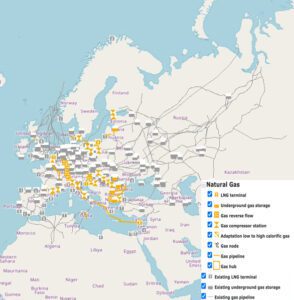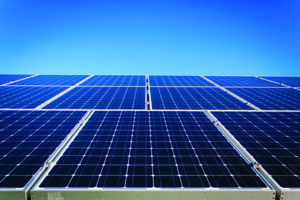Russia
-
Legal & Regulatory
UK Leans Heavily on Nuclear in Bold New Energy Strategy
A long-awaited energy strategy published by the UK government on April 6 lays out bold commitments that tackle Great Britain’s multi-pronged challenges, including achieving net-zero carbon emissions while
-
Gas
Gas Power Outlook: Volatility and Viability
Natural gas generation’s future hinges on a precarious and exceptionally volatile set of issues that the conflict in Ukraine intensified. Experts from the full natural gas chain shed light on how that
-
Gas
U.S. Agrees to Ramp Up LNG Exports to Europe, Actively Reduce Natural Gas Demand
The Biden administration and the European Commission launched a multi-pronged effort that will dramatically ramp up U.S. liquefied natural gas (LNG) exports to the European Union (EU) but also reduce overall natural gas demand in the U.S. and EU through “accelerated market deployment” of clean energy measures. The measures are part of strategic energy cooperation […]
-
Nuclear
Eight of 15 Ukrainian Reactors Remain in Operation After Three Weeks of War
Ukraine’s nuclear regulator informed the International Atomic Energy Agency (IAEA) on March 16 that eight of the country’s 15 nuclear reactors were in operation despite the ongoing Russian invasion. Of the four sites with operational units, two of six at Zaporizhzhya, three of four at Rivne, one of two at Khmelnytskyy, and two of three […]
Tagged in: -
Nuclear
Pressure on U.S. Nuclear Power Could Mount if Sanctions Imposed on Russian Uranium
Russia’s invasion of Ukraine and ensuing sanctions may have a limited immediate impact on the U.S. nuclear industry, despite its reliance on uranium imports. Potential implications over the longer term, however, require urgent action, officials from the Nuclear Energy Institute (NEI) said. NEI CEO and President Maria Korsnick told reporters at the ongoing CERAWeek by […]
Tagged in: -
Coal
Coal Use Rises, Prices Soar as War Impacts Energy Markets
The war in Ukraine is having a global impact on energy prices, not only driving the cost of oil higher, but also sending coal prices to record levels as demand for the fuel grows during a period of diminished supply. The Newcastle (Australia) futures price of thermal coal for power generation hit $435/ton on March […]
-
Commentary
Leading an Energy Company in the Aftermath of Russia’s Attack on Ukraine
CEOs of energy companies with projects in Russia are facing career-defining leadership moments. What do you do when your corporate investments nearly overnight become politically, economically and socially untenable to your key stakeholders? Within days of Russia’s unprovoked invasion of Ukraine, BP’s Chief Executive Bernard Looney was quick out of the gate to tell the world […]
-
Coal
Ban on Russian Energy Imports Gains Bipartisan, Bicameral Steam in Congress
Eighteen bipartisan U.S. Senators are backing a bill that would direct the president to declare a national emergency and prohibit imports of Russian energy commodities, including crude oil, petroleum products, liquefied natural gas (LNG), and coal. While the measure does not include Russian uranium, a senior Department of Energy official said addressing U.S. reliance on […]
-
Commentary
Minerals Crucial to Clean Energy Transition Among Ripple Effects of War in Ukraine
The venerable business of commodity trading, already in the news for the supply chain impacts of COVID, has moved to center stage with the war in Ukraine. Impacts of Russia’s invasion could ripple to manufacturing of all kinds, especially the clean energy transition we need to meet climate goals. COMMENTARY Within the first week of […]
-
Nuclear
Ukraine’s Largest Nuclear Power Plant Taken by Russian Forces
The International Atomic Energy Agency (IAEA) reported on March 4 that Russian forces had taken control of the Zaporizhzhya Nuclear Power Plant (NPP) site, but that the reactors continued to be operated by the plant’s regular staff and there had been no release of radioactive material. “What we are telling you is confirmed information that […]
Tagged in:










